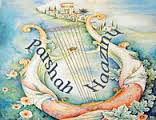 The four-year-old wasn’t listening. The husband was frustrated. He removed the child’s TV privileges for the rest of the week. And then he left for work.
The four-year-old wasn’t listening. The husband was frustrated. He removed the child’s TV privileges for the rest of the week. And then he left for work.
And the wife was left home with a four-year-old to entertain for the rest of the week without television.
Who exactly is feeling the punishment more? The four-year-old who has the mother’s attention for the rest of the week or the mother who has no resource for a reprieve?
It’s not a new concept. The goal of a consequence is to immediately address the inappropriate behaviour and educate the child on how to respond or behave differently next time. Power struggles with our children are not productive long-term; it’s not about who is bigger or louder or who’s the boss – it’s about teaching and learning respect and humility and patience.
In this week’s parashat Ha’Azinu, Moses sings a song to the Israelites on their relationship with God. As he describes their future in the land of Israel, Moses recounts how God gives them everything, yet they abandon Him: “You neglected the Rock that begot you, forgot the God who brought you forth.”
God delves out many consequences, bringing war and famine and plagues upon His beloved nation, but He stops short of destroying them completely:
I thought I would make an end of them; I would make their memory cease from among men; Were it not that I dreaded the enemy’s provocation, their adversaries who might misjudge and say, “Our own hand has prevailed, none of this was wrought by the Lord.”
God believes his nation is worthy of total destruction but He refrains from this ultimate judgement because of what the other nation’s might think. The enemies might claim that the subjugation and conquering of the Israelite nation was due to their own might or force and not to God’s ultimate power and justice.
The question is why would God dread or fear the challenges of another nation? Why would He allow their reactions to influence the consequences He believes His nation deserves?
Destroying the nation of Israel would certainly show the Israelites that God had the ultimate power – just like the father who removes all television privileges – but the educational value to the world would be lost, and, in the end, God would be punishing Himself. As the Ramban explained, the Israelite nation was chosen by God to publicise His name and carry on the memory of His miracles. Without Israel, the purpose of creation would be defeated and God’s hope and plan for the world would be lost.
When God takes into consideration what the enemies will say should He justifiably destroy the Israelites, He is showing us that the education and edification of our children must take precedence over our need to wield power. Every incident is a learning opportunity and we must be mindful not to damage our long-term goals of raising upstanding human beings in favour of meting out short-term justice out of justifiable frustration and annoyance.
How will our reactions and consequences be perceived by those we are trying to affect the most? Like God, we must acknowledge what we’d like to do out of instinct and then consider the implications of our actions and the bigger picture.
On many days, this may require a Godly-amount of patience and forethought.
Shabbat Shalom.



